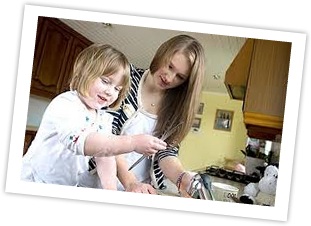- Au Pair of the Year 2024
- Stories of Au Pairs and Host Families During COVID-19
- Edna Imbachi Guaca - Au Pair of the Year 2020
- Things to Do With Your Toddler in Los Angeles
- Neila Maria Santana Costa - EurAupair Au Pair of the Year 2019
- EurAupair: Culturally Enriching, Convenient, and Affordable for 30 Years
- The Four Major Benefits of EurAupair's Au Pair Program in America
- Lorena Simon - EurAupair Au Pair of the Year 2018
- Things to Do With Your Toddler In Boston
- Never say goodbye… | An Au Pair Reunion Story
- Things to Do With Your Toddler In Chicago
- Home Sweet Home: How To Cope With Reverse Culture Shock
- Former Au Pair Mette Sharing Her Year as an Au Pair!
- Former Au Pairs... Where Are They Now?!
- Karina Kolbe - EurAupair Au Pair of the Year 2017
- New Year's Resolutions for Au Pairs in the U.S.
- Au Pair Holiday Gift Ideas for Host Families
- An Au Pair Guide to Thanksgiving - An American Tradition
- Tricks and Treats to Enjoying Halloween With Your Host Siblings
- When One Gap Year Ended Into the Best 4 Years of My Life
- Former Au Pair and Community Counselor Laetitia Mouton’s Story
- 6 Fun After School Activities for Host Families and Au Pairs
- Summer Fun With The Kids
- Au Pair Story - Farm Life
- EurAupair's 2016 National Month of Giving
- Money Management for Au Pairs
- Glossary: Understanding the Au Pair Lingo
- Elise Ducam - EurAupair Au Pair of the Year 2016
- Can au pairs provide child care over the holidays
- 7 Facts about the EurAupair NYC Workshop
- Surviving Snow Days as an Au Pair in America
- What do you do to entertain a 20-year-old when you’ve forgotten what it’s like to be 20?
- My Time with my American Family!
- Jacqueline Maersch - EurAupair Au Pair of the Year 2015
- True American Experience for Au Pair Jennifer
- My 21 Months in the USA
- Quick Overview of American Holidays
- Svenja Kupke - EurAupair Au Pair of the Year 2013
- French Au Pair Emilie’s Story
- EurAupair Au Pair Awarded IAPA Au Pair of the Year
- Au Pair Alice Shares Her Experience
- Advantages of Becoming an Au Pair
Glossary: Understanding the Au Pair Lingo
For au pairs in the USA, spending a year as an exchange program participant is an exciting opportunity to learn about a new culture, further their education, and become part of an American family as they help care for the children. Understanding the following terms may be useful for EurAupair au pairs applying to become an au pair in America.
Area Coordinator – Your next point-of-contact should you have any concerns about your Community Counselor or not be able to reach your Community Counselor.
Au Pair Folio – The booklet you received during your pre-departure orientation. Your folio will be signed during the EurAupair NYC workshop, your orientation with your Community Counselor, during all monthly meetings, and by your instructors to confirm your Academic Coursework Completion. You will be asked to submit copies of your folio towards the end of your year in order for us to verify the successful completion of your program.
Co-pay – A term used in medical/dental insurance to describe the payment that must be made for each visit at the doctor/dentist.
Community Counselor – Each family and au pair has a Community Counselor close to their home, available throughout the year for advice and support. The Community Counselor will organize, once a month, a meeting with you and any other au pairs in his/her area. Twice a year your Community Counselor will plan cultural meetings, which is another chance for you to experience something specific to the United States or to your local area. You may reach out to your Community Counselor at any time with questions or to discuss any concern or issue.
Conflict-Resolution Meeting – Should you run into issues with your host family, you can seek the help & advice of your Community Counselor. Your Counselor will give you the tools to address any concerns with your family and/or overcome them. If this is not enough, your Community Counselor will schedule a conflict-resolution meeting with you and your family in order for the concerns to be addressed & for a solution or compromise to be found. The same applies should your host family express concerns to the Community Counselor.
Credits & CEU – A course credit (often credit hour, or just credit or "unit") is a unit that gives weight to the value, level or time requirements of an academic course taken at a school or other educational institution. CEU stands for Continuing Education Unit. Au pairs need to complete 6 credits (equivalent to 72 hours) during their year as an au pair.
Deductible – Cash amount that must be paid by the insured before the insurance company will pay on a claim. This term is used in medical/dental insurance coverage as well as auto insurance.
Department of State (DoS) – The U.S. federal executive department responsible for the international relations of the United States, equivalent to the foreign ministry of other countries. Among other programs, it regulates the au pair program.
DS2019 or DS-Form – A “Certificate of Eligibility for Exchange Visitor (J-1) Status”, a form issued by EurAupair, your program sponsor. It is not to be confused with a VISA, which is issued by a U.S. Embassy or Consulate. You will need both a valid DS Form and VISA in order to enter the U.S. Extension au pairs receive a new DS-Form – which allows them to continue being an au pair in their extension – but not a new VISA (which means that if an au pair leaves the country during her extension, she cannot re-enter with a valid DS Form but expired VISA).
Housework & Household Chores – As an au pair you will be expected to assist with light housework (such as doing the children’s laundry, helping them tidy/clean their room) and to do your share of household chores (such as getting groceries, helping with dishes, taking the trash out, etc.) just like it is expected from other members of the family. Your responsibilities do not include heavy housework, gardening, caring for pets, or the elderly.
Stipend – The pocket money you will receive weekly from your host family.
13th Month or Travel Month – At the end of your program year you will have the possibility to stay in the U.S. for up to 30 days, during which you may not work but are welcome to travel (in the US) and explore the country before heading home. Please remember that your insurance covers you for 12 months and you should consider purchasing insurance for your 13th month. Extension au pairs may enjoy their travel month only after completing their extension (not at the end of their first program year).
For more information on becoming an au pair in America please contact our partner organization in your home country!




